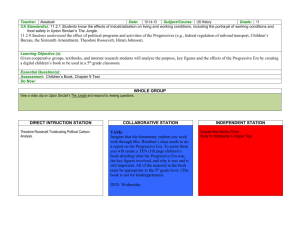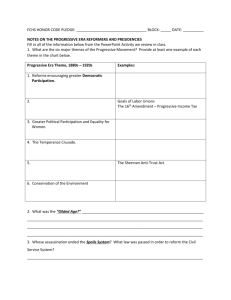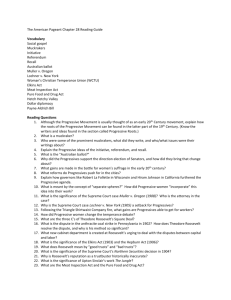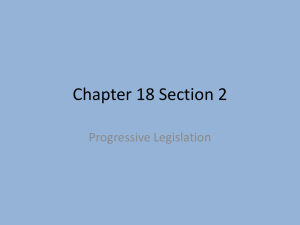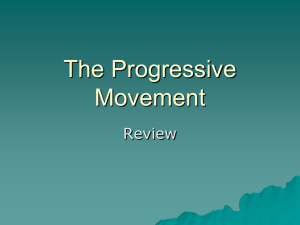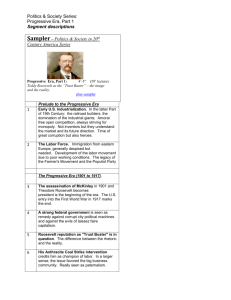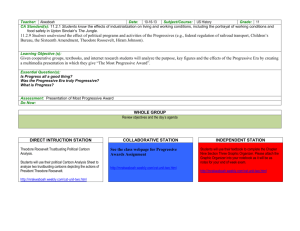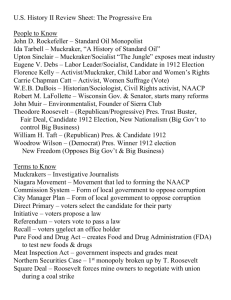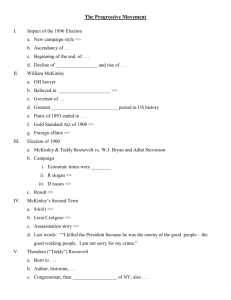AMERICAN HISTORY
advertisement
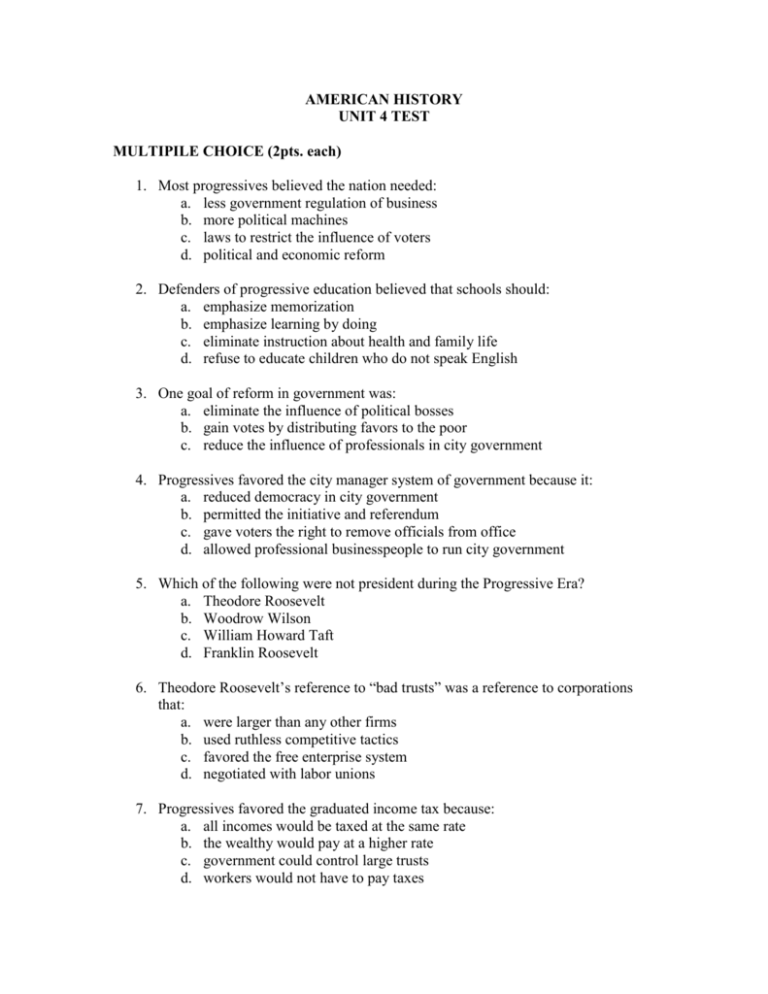
AMERICAN HISTORY UNIT 4 TEST MULTIPILE CHOICE (2pts. each) 1. Most progressives believed the nation needed: a. less government regulation of business b. more political machines c. laws to restrict the influence of voters d. political and economic reform 2. Defenders of progressive education believed that schools should: a. emphasize memorization b. emphasize learning by doing c. eliminate instruction about health and family life d. refuse to educate children who do not speak English 3. One goal of reform in government was: a. eliminate the influence of political bosses b. gain votes by distributing favors to the poor c. reduce the influence of professionals in city government 4. Progressives favored the city manager system of government because it: a. reduced democracy in city government b. permitted the initiative and referendum c. gave voters the right to remove officials from office d. allowed professional businesspeople to run city government 5. Which of the following were not president during the Progressive Era? a. Theodore Roosevelt b. Woodrow Wilson c. William Howard Taft d. Franklin Roosevelt 6. Theodore Roosevelt’s reference to “bad trusts” was a reference to corporations that: a. were larger than any other firms b. used ruthless competitive tactics c. favored the free enterprise system d. negotiated with labor unions 7. Progressives favored the graduated income tax because: a. all incomes would be taxed at the same rate b. the wealthy would pay at a higher rate c. government could control large trusts d. workers would not have to pay taxes 8. Progressives favored the direct election of U.S. Senators because they thought that: a. political machines would become more powerful b. state legislatures would become more powerful c. political corruption would lessen and voter turnout would increase d. the power of Congress would increase 9. All of the following were goals of the Progressive Era EXCEPT: a. de-regulation of business b. restriction on child labor c. consumer protection d. preservation of the environment 10. Progressives favored: a. a laissez-faire approach b. an active government c. a monarchy d. a dictatorship 11. Roosevelt’s action in the 1902 Pennsylvania Coal Miner’s Strike and his support for the creation of the Department of Commerce and Labor indicated that he favored: a. ending the Square Deal b. abolishing the progressive movement c. government supervision of business d. prosecution of all trusts 12. Passage of the Meat Inspection Act of 1906 indicated Roosevelt’s determination to: a. resist the demands of muckrakers b. regulate industry that ignored public interest c. abolish the free enterprise system d. negotiate with labor unions 13. The purpose of patronage is to: a. increase profits b. increase efficiency c. reward one’s supporters d. prevent power from being concentrated in one individual or group 14. The basic structure of the political machine contained all of the following EXCEPT: a. ward boss b. precinct captain c. soldier 15. The Pendleton Act of 1882 dealt with: a. tariffs b. Native Americans c. civil service d. income tax 16. Boss Tweed of New York City was brought down by: a. U.S. government b. The New York Times c. A journalist who wrote political cartoons d. The governor 17. The Civil Service Commission a. guarantees lifetime government jobs b. is based on the merit system c. chooses its members based upon patronage d. was created by the Tenure Act 18. Which president was assassinated for his position on civil service? a. James Garfield b. Chester Arthur c. Rutherford B. Hayes d. Grover Cleveland 19. What role have third parties played in American presidential elections? a. upset winners in several elections b. have never been a factor c. spoiler 20. In the Election of 1912, which third party candidate pulled votes away from the incumbent President? a. Woodrow Wilson b. Theodore Roosevelt c. Franklin Roosevelt d. Ross Perot MATCHING Mark your answers in Part 2-Matching (2 pts. each) 1. 19th Amendment a. allows citizens to propose a law 2. muckrakers b. direct election of U.S. Senators 3. referendum c. graduated income tax 4. 16th Amendment d. allows voters to select their party’s candidate 5. primary election 6. 18th Amendment 7. initiative e. allows voters to remove elected officials from office f. efforts to persuade legislators to vote for or against certain bills 8. recall g. prohibition th 9. 17 Amendment h. women’s right to vote 10. lobbying i. allows voters to accept or reject already proposed or enacted laws j. writers who exposed corruption in business and government ESSAY Write in complete sentences (10 pts. each) 1. Identify the three types of reform that occurred during the Progressive Era and explain the significance of each. Discuss at least two examples for each type of reform. 2. Discuss the following Progressive Era events that took place while President Roosevelt was in office. Describe each event in detail and explain its’ significance. a. Upton Sinclair’s book, The Jungle, and the subsequent Meat Inspection and Food and Drug Acts. b. The 1902 Pennsylvania Coal Miner’s Strike Settlement c. The breaking up of the Standard Oil Trust and the Northern Securities Company.

